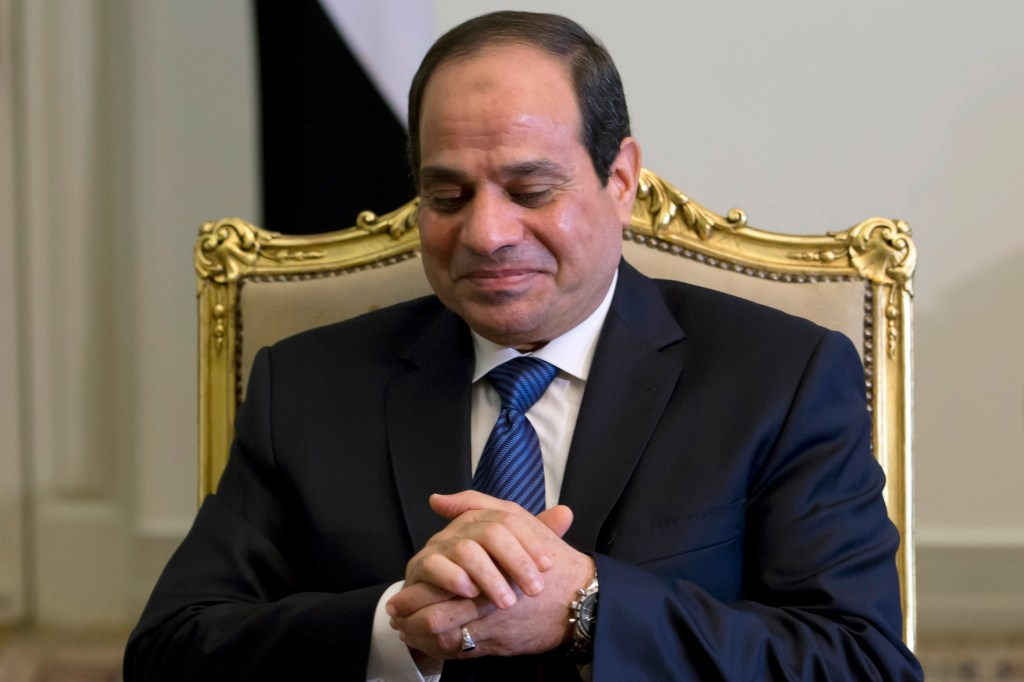Egypt’s chief prosecutor urged his staff to hunt down “forces of evil” on social media and traditional news outlets Wednesday.
The threatening message has human rights activists worried a fresh crackdown of Facebook or Twitter posts critical of the government may be in store ahead of presidential elections in March.
Videos by VICE
“Facebook, Twitter and YouTube are not yet blocked in Egypt, but it looks like the government is heading in that direction,” Amr Magdi, a researcher for Human Rights Watch, told VICE News.
“The government has recently extended its suppression of freedom of speech to social media and electronic press,” Magdi said.
The prosecutor’s warning is the latest step in what observers say has been a dramatic clampdown on human rights and free speech in Egypt under President Abdel Fatah el-Sisi. His government is responsible for the arrests of over two dozen journalists, the shuttering of national and international media, and the widely documented police practice of forced disappearances and torture.
In a statement, Egypt’s General Prosecutor, Nabil Sadek, ordered senior prosecutors to take legal action against outlets that deliberately publish false reports that impact public security, create fear, or harm the interests of the state.
The order comes “in light of recently observed attempts by the ‘forces of evil’ to undermine the security and safety of the country through publishing lies and fake news through different media outlets and social media,” the statement said.
Egyptian activists started being jailed over their social media posts in late 2016, Magdi said. This trend escalated in 2017.
Between April and September 2017, Egyptian authorities arrested at least 240 people from opposition parties and political youth groups in relation to protests or comments posted on social media that were critical of President Sisi, according to Amnesty International.
Egypt has already blocked hundreds of websites, Margaux Ewen, Reporters Without Borders’ North America Director said, and this latest statement suggests he’s far from finished.
“Egypt’s chief prosecutor is seeking to silence Egyptian journalists and media outlets ahead of the March elections,” Ewen said, pointing out that her own organization’s website has already been blocked in Egypt. The crackdown over online freedoms marks “a substantial escalation in a political environment that vehemently denies freedom of information.”
Last November, a social media satirist known for his biting Twitter posts on politics, art and media was arrested in what The Arabic Network for Human Rights Information described as a “crime.” The police later told his friends and family they had no idea where he was, according to Amnesty International.
Prominent Egyptian rights lawyer Nasser Amin wrote in a Facebook post that the prosecutor’s statement would likely have a “destructive impact on rights and freedoms on the one hand as well as the Egyptian judicial system on the other.”
Wednesday’s announcement follows a fresh feud between senior Egyptian officials and the BBC over an investigative report about Egyptian police abuses. The country’s official State Information Service, which oversees foreign media representatives in Egypt, called on senior government officials to stop giving interviews to the UK outlet, and slammed the report for containing “lies and allegations.”
Cover image: Egypt’s President Abdel Fattah al-Sisi waits for a meeting with U.S. Treasury Secretary Jack Lew at the presidential palace in Cairo, October 27, 2014. REUTERS/Hassan Ammar/Pool




